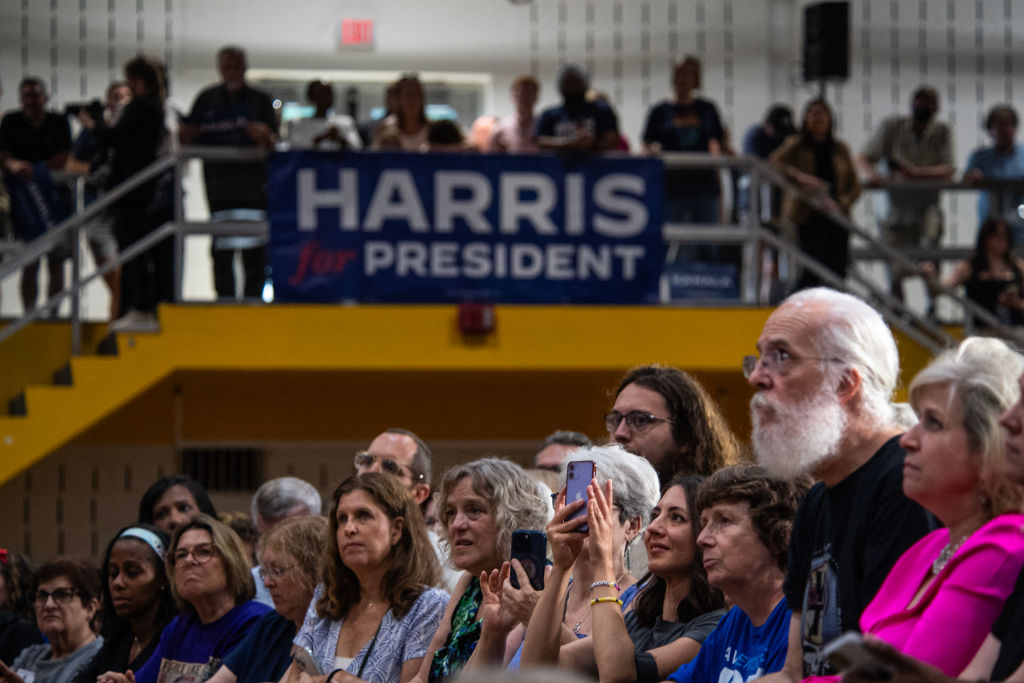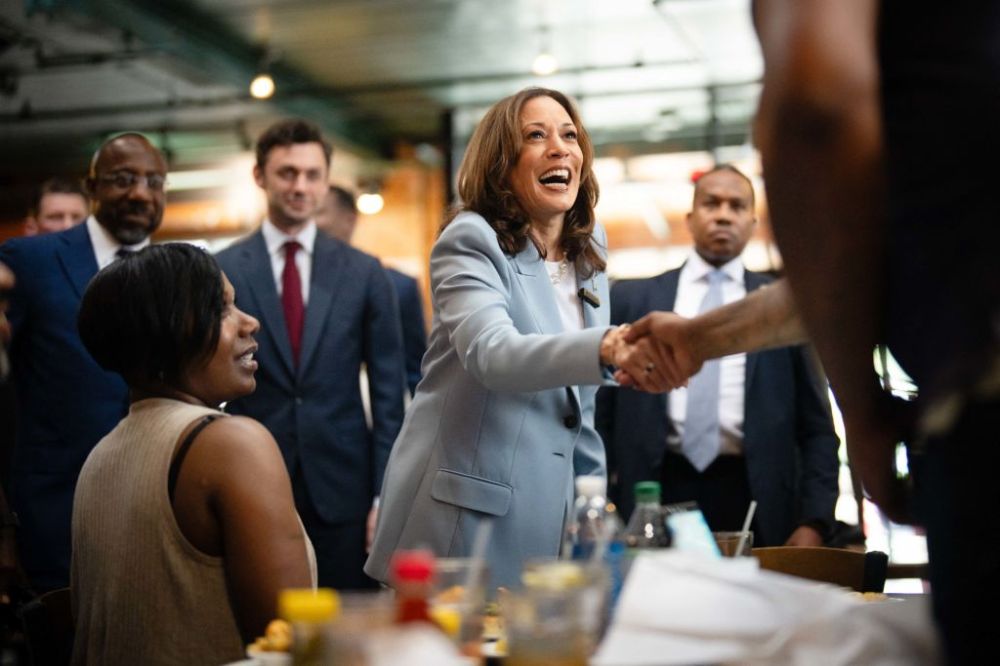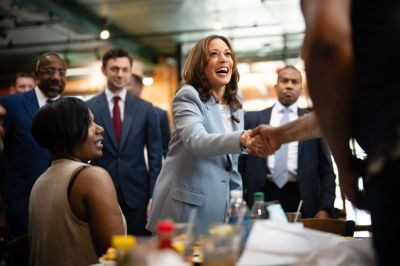Everyone who’s passionate about politics hates a flip-flopper.
At best, a candidate who reverses his positions opportunistically to improve his chances of winning believes in nothing. His “vision” for the country is “whatever will get me 51 percent.” Voters who care about policy can’t help but find that contemptible.
At worst, the candidate is engaged in calculated deception. He does have a vision for the country, but knows it’s unpopular and is likely to lead to defeat if he runs on it. So he reverses himself for the general election, fully intending to resurrect his secret agenda once safely in office. Voters who care about policy can’t help but find that sinister.
Donald Trump’s retreat from federal abortion restrictions illustrates the point. Ardent pro-lifers find it contemptible that he’d abandon a high moral priority for the sake of picking up a few votes. Ardent pro-choicers maintain that he hasn’t abandoned it at all but is merely pretending to have done so in order to pander to moderate voters. When he’s back in the White House, his sinister true colors will show.
Everyone hates a flip-flopper. But everyone—or nearly everyone—hates losing more.
Most voters don’t want their candidate standing firm on principles that might plausibly cost him the election. In fact, they might be angry if he did—and understandably so. What good would it do pro-lifers for Trump to propose a national abortion ban if doing so guaranteed victory for a radically pro-choice Democrat?
You can admire steadfast ideologues like Bernie Sanders for their sincerity if you like, but there’s a reason Bernie never became president.
All of which brings us to the exciting news that Kamala Harris has begun flip-flopping more spectacularly than the U.S. gymnastics team in Paris. From the New York Times:
The Harris campaign announced on Friday that the vice president no longer wanted to ban fracking, a significant shift from where she stood four years ago but one that is consistent with the policies of President Biden’s administration.
…
In addition to changing her position on fracking, campaign officials said she now backed the Biden administration’s budget requests for increased funding for border enforcement; no longer supported a single-payer health insurance program; and echoed Mr. Biden’s call for banning assault weapons but not a requirement to sell them to the federal government.
For good measure, her campaign also pledged not to raise income taxes on households earning less than $400,000 each year—and that’s just the policy side of her reversals. Her career as a prosecutor, which she downplayed during the 2019 Democratic presidential primary, is now Exhibit A in her case that she’s not as left-wing as swing voters might fear.
From Jonah Goldberg’s lips to God’s ears: One of the most progressive members of her caucus during her time in the Senate and on the debate stage during her first run for president sounds increasingly like Joe Manchin. And not a moment too soon.
What should we think of Kamala Harris’ flip-flopping?
A near-death experience.
Policy reversals by a national candidate are hard to analyze objectively. If you favor that candidate, and if she’s flip-flopping toward your positions rather than away from them, how angry can you be?
Jonah will speak for himself, but I think it’s safe to say that we both prefer the Manchin-ized version of Kamala Harris to the 2019 version of Kamala Harris—and that we both really, really do not want to find out the hard way how crazy a second Trump administration could be. So we’re both willing to cut her more slack on her gymnastics than a devout Republican partisan would be.
The entire Democratic coalition is similarly willing, I suspect, including many of the progressives whom she’s flip-flopping away from. That’s because, as a party, they recently survived a near-death experience.
Republicans did too, of course—and in their case it was literal. A few weeks ago, they came within a fraction of an inch of losing their nominee and plunging into one of the most dire leadership crises in American political history. But Democrats had their own figurative brush with death playing out at the same time. They were on track to lose the election badly, possibly suffering a wipeout down ballot, and the one man who could do something about it either didn’t believe it or didn’t care.
Within the span of eight days, both parties were granted a second lease on life. The difference is that the Republican nominee hasn’t learned anything from his near-death experience whereas Democrats, to all appearances, have. Their new nominee intends to run to the middle to try to appeal to swing voters and, judging by the skyrocketing enthusiasm for her, the same progressives who complained so loudly about Joe Biden’s centrist foibles look poised to indulge her in it.
Everyone hates a flip-flopper … except when the alternative is death.
Everyone hates a flip-flopper … except when the alternative is death. Having just had their political lives flash before their eyes, Democrats and the rest of the anti-Trump coalition are more disposed to read Harris’ reversals as proof of strategic intelligence and political vitality than as contemptible or sinister.
Age also matters, I think, for both young and old.
For very young voters who weren’t eligible to cast a ballot in 2020, Harris’ flip-flops won’t be perceived as flip-flops. They’ll be the positions she’s “always” held. “To those of relaxed engagement, especially the young, she will be a new figure,” Peggy Noonan recently wrote of the Democrats’ new (presumptive) nominee. “They’ll be seeing her for the first time. They’ll be open to what they see.” A 20-year-old voter won’t know Harris as the awkward bumbler who ran to Bernie Sanders’ left in 2019. They’ll know her as a no-nonsense prosecutor who’s going to move America past Trump.
Jonah noted in Friday’s G-File that he’s less passionate now about politicians standing on conviction than he was as a somewhat younger man. The same is true of me and, I suspect, of most others. It’s a simple matter of growing more jaded with time: Your hundredth experience of watching a politician flip-flop will inevitably irritate you less than the first did.
Or it might be a function of having lived through a saner, more bipartisan era of American politics in our youths and finding ourselves so desperate to return to it that even cynical pivots toward centrism seem encouraging and worth celebrating. If Donald Trump chooses to renounce authoritarianism and embrace classical liberalism purely to maximize his electoral appeal, I hereby pledge not to let his selfish opportunism dampen my happiness about the change.
To those conservatives whose enthusiasm for Harris’ switch is a bit soggy despite her moving in their direction, let me ask: If we all desire a more centrist Democratic Party, when would be a more opportune moment for the party to move right than this moment?
In 2028? A centrist like Gov. Josh Shapiro might prevail in that year’s presidential primary, but then again, he might not. He could get eaten alive by a charismatic progressive like Gov. Gavin Newsom, who would steer the party to the left.
Or imagine instead that Harris clung to her far-left beliefs from 2019 and went on to win this year anyway thanks to Trump’s weaknesses as a candidate. That would teach a new generation of Democrats, however falsely, that progressivism is an electoral asset rather than a liability. It could take a decade or more for that lesson to be unlearned.
If you want a saner left, Harris tacking toward the center and overtaking Trump to win is the fastest route there. She’s been given a remarkable gift in not having to pander her way through a primary to earn the nomination this year; it’d be idiotic for her not to take full advantage by dispensing with “defund the police” nonsense and open-borders rhetoric and leaning into law enforcement in all its particulars.
Meeting the voters where they are is how democracy is supposed to work, no?

Supply and demand.
My former colleague Andrew Egger said yesterday of Harris’ flip-flopping that “Republicans have SUCCEEDED in dragging Democrats back toward the center on all kinds of stuff after the litmus-testing fever dream of the 2020 primary. Harris is a party person and this reflects that.”
That’s a smart point about Harris, I think, but the rest isn’t quite true. Voters, not Republicans, have succeeded in dragging Democrats back toward the center by punishing them ruthlessly four years ago for their cop bashing and are preparing to punish them again this year for their dereliction of duty on immigration.
As cynical and selfish as it is, flip-flopping is just a politician’s way of conceding that they’ve lost a policy argument with voters. Trump’s moderation on abortion is no different. The electoral “market” is demanding a certain product; candidates can either supply it or go out of business. Whether those candidates like that product as much as their customers do is neither here nor there so long as they continue to supply it.
“But why should we assume Kamala Harris will continue to supply it as president instead of reverting to her progressive ways?” you might respond. Surely, the reluctance with which a politician adopts a policy is evidence of how quick they might be to abandon it once in office.
It’s fair to worry that Harris will revert to a sinister progressive vision for the country once she’s safely elected, but concern over Trump implementing his own sinister version is equally fair and considerably more frightening. And if you’re inclined to equate the two, you’re overlooking an important difference between them: Harris is far more likely to face meaningful institutional checks as president than Trump is.
I made that case at length last week. Unless Republicans underperform in November beyond all expectations, they’ll control the Senate next year and will likely expand their majority in 2026. Harris’ legislative agenda would be paralyzed from the moment she’s sworn in to the end of her term. Every one of her Cabinet and judicial nominees would be subject to a Republican veto. And if she tries to compensate by taking aggressive executive action, she has a 6-3 conservative Supreme Court majority waiting for her.
She could, if she likes, appease progressives by embracing executive inaction of the sort Biden has used to make a mess of the southern border. But that brings us back to the corrective power of democracy: If she stubbornly refuses as president to supply a policy product that many Americans are clamoring for, they’ll elect Republicans in 2026 and 2028 who will.
Who knows? She might even get a taste for assimilating broadly popular policies into her agenda if her gambit of flip-flopping her way to victory over Trump pays off.
Harris’ announcement on Monday that she supports Joe Biden’s dubious Supreme Court reforms is the exception that proves the rule. It’s true that those reforms were meant as a pander to the left, not to the center, and could result in court-packing by another name if enacted. (Spoiler: They won’t be.) But it’s also true that, for better or worse, broader public esteem for the court has declined and support for reforming it is robust. The Biden-Harris pander in this case might not be centrist, per se, but it is popular.
To all of that one might reply that Harris can’t govern exclusively from the center or else the left will turn on her in 2028. And that’s true, sort of: Every president needs to dole out some candy to the base from time to time. But if there’s any incumbent who needn’t worry about a serious primary challenge, it’s the first woman (and second black) president—one who, four years from now, could very plausibly be facing off against another proto-fascist in the general election and will need a unified party behind her to win.
President Kamala Harris will not be primaried. She can govern as popularly as she likes.
Does it matter?
The biggest political risk to her in flip-flopping isn’t that voters will find her reversals cynical and self-serving. It’s that they won’t notice them.
Flip-flops offend passionate political activists, but I suspect most Americans don’t give a rip. Trump’s own running mate has flip-flopped from wondering in 2016 whether Trump might become “America’s Hitler” to becoming a loud-and-proud authoritarian cheerleader now. Despite describing Harris lately as “real garbage,” Trump himself donated to her more than once during her runs for attorney general of California—not the first time he’s contributed to the campaign of a Democrat who later opposed him for the presidency.
The average voter is appropriately cynical about politics and unfazed, I think, by rank opportunism. I wonder, frankly, how much that average voter cares about policy at all in 2024 apart from a few electric hot-button issues like abortion and the border crisis. Millions of votes this year will come down to judgments about which party would be better on inflation, never mind that many voters don’t understand the economics of the problem or hold anything resembling an informed opinion of why one candidate would handle the issue better than the other.
We are no longer a country that engages seriously with serious problems. If you doubt that, consider Trump’s recent positions on Taiwan, TikTok, and Xi Jinping and remind yourself that most Americans think he’s the China hawk in the race.
But insofar as voters do care about policy, they’re about to be buried under an avalanche of clips of Kamala Harris circa 2019 sounding like an even more pinko Elizabeth Warren. She and her party will spend the next three months pleading with Americans to ignore those clips, one and all, on grounds that, er, everything she said in them was a lie.
And that’s the best-case scenario, that voters become convinced en masse that she was (and presumably still is) an incorrigible liar. The worst-case scenario is that many people following the campaign will casually be inundated with the old clips of Harris, conclude from them that she’s a less charismatic Alexandria Ocasio-Cortez, and never stumble across the flip-flops that ostensibly demonstrate how her time as vice president has led her to a centrist awakening.
If she wants to be a political gymnast, then, she’ll need to do it with gusto. There’s no point in reversing herself opportunistically to impress voters if she’s reluctant to advertise those reversals aggressively. The true value of flip-flops, after all, isn’t that they communicate something profound about a politician’s true policy priorities but that they provide voters who are searching for excuses to support that politician with some quasi-rational pretext to justify doing so. Making sure they’re aware of that pretext will take real effort.
But it’s worth it. Trump might be unpopular enough with swing voters that all it’ll take to tilt them toward the Democrat is a few insincere assurances that they can trust President Harris not to do anything too radical in office. She should give that to them, as shamelessly as possible.






Please note that we at The Dispatch hold ourselves, our work, and our commenters to a higher standard than other places on the internet. We welcome comments that foster genuine debate or discussion—including comments critical of us or our work—but responses that include ad hominem attacks on fellow Dispatch members or are intended to stoke fear and anger may be moderated.
With your membership, you only have the ability to comment on The Morning Dispatch articles. Consider upgrading to join the conversation everywhere.